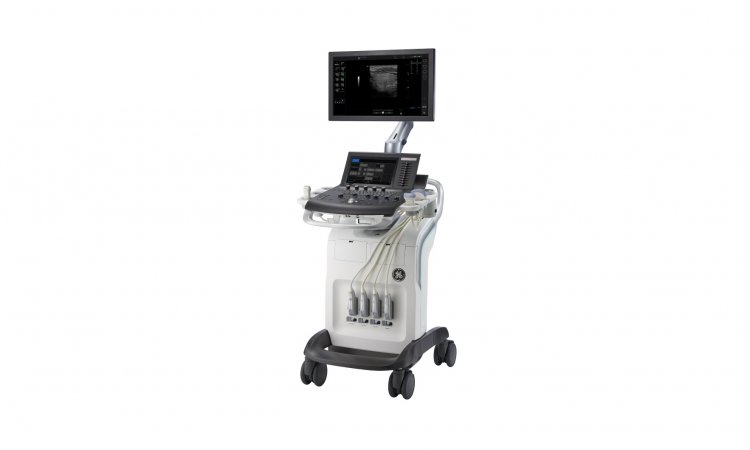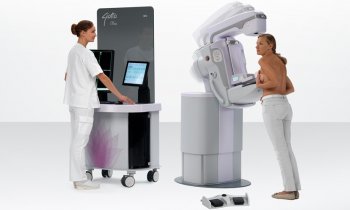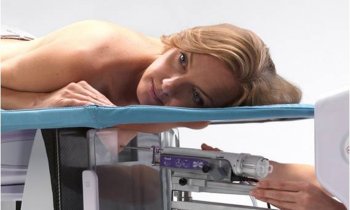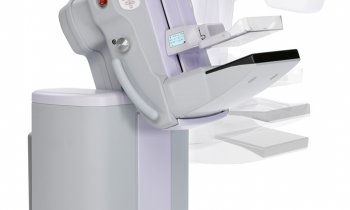Source: GE Healthcare
Article • Patient front and centre
One-Stop Clinic: diagnosis and treatment in one day, on one site, by one team
Cancer – one word that turns the patients’ world upside down. In addition to uncertainty and fear, they often face an unnerving series of exams and treatments. With its new One-Stop Clinic concept, GE Healthcare now wants to help make this journey as smooth as possible. At a single location, in an environment designed for comfort, the patients undergo all necessary steps within a short period of time, from initial exam to follow-up, and always cared for by the same team.
Report: Sonja Buske
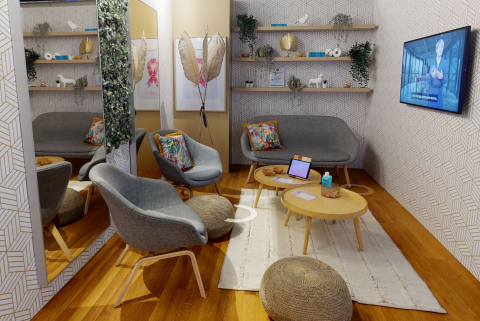
Patient experience has been a buzzword for some time. Many companies are putting a lot of brain power into designing their systems not only for clinical efficiency but also for comfort so the patients are more likely to accept the devices. “It does not make economic sense for a hospital to have the best-in-class mammography system but the patients refuse to be examined with it because it is intimidating or scary,” says Vjosa Zeqiri, Modality Marketing Communications Leader EMEA at GE Healthcare, and adds that “With One-Stop Clinic we go one step further and align not only the environment but the entire workflow to patient comfort.”
Focus on oncology
While this approach can be applied to all clinical disciplines, GE Healthcare focuses on oncology since usually the highest number of exams, treatments and departments are involved. “Today, patients are often sent from one centre to the next and they have to wait a long time for their results and the next appointment,” Zeqiri explains. When handling a breast cancer case in a One-Stop Clinic, she says, “ideally gynaecologists, oncologists, pathologists, surgeons, radiologists and nuclear medicine experts work together and everything – from the initial exams through mammography, biopsy, therapy and follow-up – can be done under one roof.” The aim is to provide diagnostic results on the same day and lab results within 48 hours. GE training for the entire team covers equipment use and each step along the way – and drives home the importance of such a holistic solution.
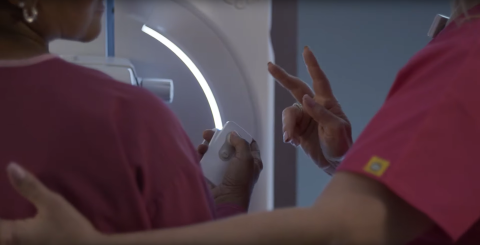
The concept was developed with the help of a patient representative, who contributed her psychological insights, and an interior designer. Ideally, the journey starts in the waiting room where patients can call up an app that provides information about the exams lying ahead or podcasts on relevant topics. “This makes the patients feel well-informed which in itself alleviates stress,” says Zeqiri. During the mammography video projections with relaxing music create a pleasant atmosphere. Very importantly, guided by experts the women can remotely control the compression of the breast. “Experience has shown that women who control the exam themselves tend to accept a higher degree of compression. This significantly enhances the results and reduces the rate of repeat exams,” Zeqiri explains.
Patient organisations demand patient-centric care

While the one-stop concept is most easily realized when building a new hospital, a scaled-down version can be integrated into existing workflows, the GE expert underlines: “True, hospitals can’t set-up new departments overnight, but light and colour concepts, pleasant furniture and a dedicated app are things that can be introduced almost anywhere. The more disciplines are located on-site, the quicker the patients can be helped. Patient organisations increasingly demand such patient-centric care.”
The One-Stop Clinic has already been implemented in hospitals in the US, Latin America, Turkey, France and Spain. After the presentation at ECR 2022 in Vienna, more European countries, including Switzerland and Germany, have shown interest and even started projects. In the future, GE will continue to focus on comprehensive solutions rather than isolated products as Zeqiri points out: “The therapy has to be integrated into the treatment journey. It must not fall by the wayside.”
Profile:
Vjosa Zeqiri (32), a business administration graduate from Zurich, has been with GE Healthcare since 2006 and is currently the Modality Marketing Communications Leader in charge of the Women's Health division for the EMEA region.
Recommended article
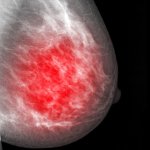
News • Impact of body constitution
Breast cancer: Tumour environment can affect prognosis
The interplay between the patient’s BMI, tumour size and cancer-specific proteins is of importance for the prognosis of breast cancer, a study from Sweden shows.
23.09.2022
- biopsy (83)
- breast cancer (625)
- breast imaging (125)
- cancer (1024)
- mammography (258)
- management (224)
- therapy (845)
- women's health (337)





